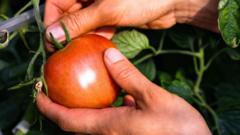The BBC's findings indicate that several UK supermarkets may unknowingly line their shelves with tomato products containing Chinese tomatoes produced using forced labor in Xinjiang.
‘Italian’ Tomato Purees Linked to Forced Labour in China, BBC Investigation Reveals

‘Italian’ Tomato Purees Linked to Forced Labour in China, BBC Investigation Reveals
Supermarkets face scrutiny as allegations emerge about tomato sourcing from Xinjiang Province.
In a revealing investigation, the BBC has found that numerous “Italian” tomato purees sold by popular UK supermarket chains may be tainted with tomatoes grown under dubious conditions in China. This report comes amid ongoing concerns regarding human rights abuses in the Xinjiang region, where Uyghurs and other Muslim minorities are reportedly subjected to forced labor.
The investigation examined a total of 64 different tomato purees sold in the UK, Germany, and the US, noting that many claimed to contain Italian-grown tomatoes. Amongst the products investigated, 17 purees presented indications of containing tomatoes sourced from China, with a significant number linked to Italian company Antonio Petti. This company has received millions of kilograms of tomato paste from Xinjiang-based suppliers over recent years, raising questions about the ethical sourcing of ingredients.
In Xinjiang, which produces about one-third of China’s tomatoes, the area has been marred by allegations of mass detentions and human rights abuses since 2017. Witnesses who have spoken to the BBC recount harrowing experiences of forced labor in tomato fields, including instances of violence and inhumane working conditions. China, however, vehemently denies these claims, asserting that all workers' rights are upheld.
Notably, the BBC's examination revealed that amidst this troubling scenario, supermarkets such as Tesco, Waitrose, and Morrisons have disputed the findings, stating they have conducted independent investigations finding no evidence of Chinese tomatoes in their products. Tesco has since suspended supply, while Lidl admitted to previously using Chinese tomatoes in another product version amid supply chain challenges.
Documented evidence further complicates the narrative. An undercover BBC reporter discovered that the Petti firm had, in fact, sourced tomatoes from Xinjiang in 2023, despite prior assurances that they had ceased such operations following US sanctions. Petti maintains that their current suppliers do not engage in forced labor; however, some analysts question the validity of their claims, suggesting connections between different Chinese companies.
Policy responses in Europe and the UK are lagging behind more stringent regulations seen in the US, raising fears among human rights advocates that the interwoven global supply chains allow abuses to continue unchecked. As the EU moves towards tighter regulations, experts warn that the UK might inadvertently become a refuge for products linked to forced labor due to its current, lenient approaches.
The ramifications of this investigation extend beyond individual products to larger discussions around food integrity and corporate accountability. As scrutiny increases, consumers are urged to consider the implications of sourcing practices and the broader ethical context behind affordable food products.




















